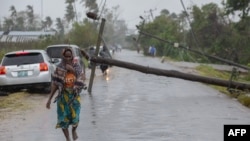"While cholera outbreaks regularly occur in Mozambique between October to April, with almost 21,000 cases and 95 deaths, this is the largest outbreak in more than a decade," said Severin von Xylander, the WHO's representative in the southeast African country.
"The outbreak is still expanding geographically," he told reporters in Geneva in a briefing via video link from Maputo. Eight of the country's 11 provinces have been affected.
Quelimane is the worst-affected city and in the last 24 hours, 132 people have been admitted to cholera treatment centers and 350 people have received cholera care visits.
"After the landfall of Freddy, the number of cases exploded from less than 20 a day and increased tenfold" in the city, Von Xylander said.
A first cholera vaccination campaign started in late February in four provinces. More than 715,000 people were given a single shot.
A second campaign was launched Thursday in Quelimane, targeting 410,000 people.
Vaccination programs will be extended to other provinces, with more than 1.35 million people currently being targeted.
WHO teams are responding to five concurrent health emergencies in Mozambique: besides cholera and the Cyclone Freddy flooding, polio, Covid-19 and an ongoing humanitarian crisis in the north are causing a situation that is "overwhelming" health systems, said Von Xylander.
Cyclone Freddy destroyed more than 132,000 homes and 184,000 people were displaced, and while the floods are now receding, access to safe water is "challenging", he said, while around a third of crops have been destroyed.
"In the coming weeks, the number of malaria cases will drastically increase and the malnutrition rate - already very high - will go up," said Von Xylander.
"I don't intend this brief to be a scaremonger, but I hope to raise the alarm for a concerning situation currently lived here by millions of individuals," he said.
Massive Mozambique Cholera Outbreak

GENEVA - Mozambique is going through its worst cholera outbreak in more than a decade in the wake of Cyclone Freddy, the World Health Organization said Friday.





